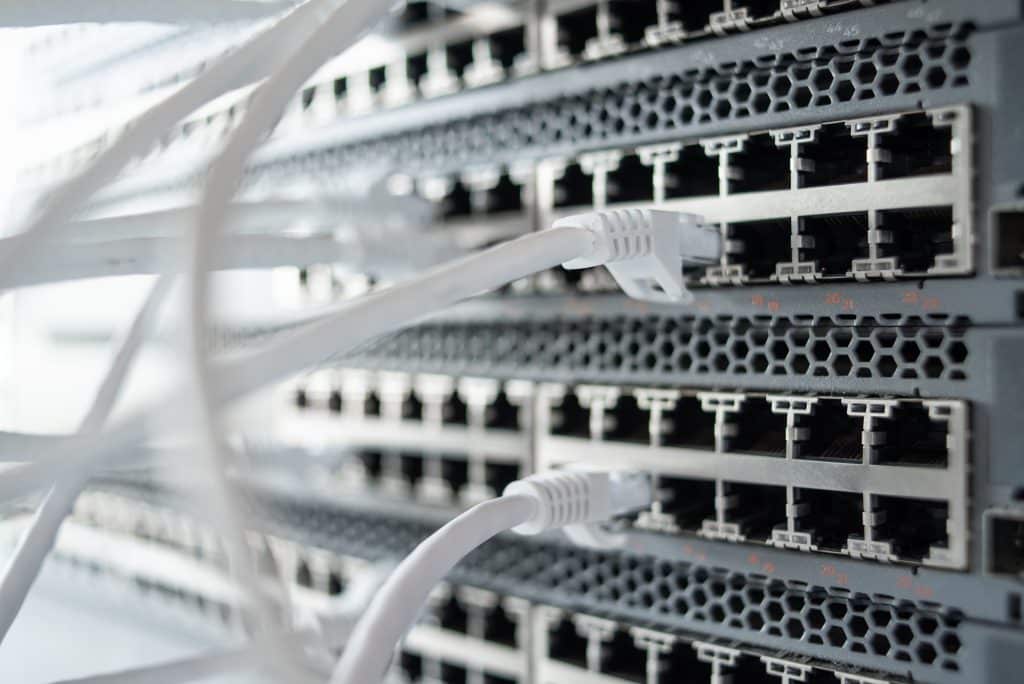POS System Integration: Reliable UniFi Networks for Retail Operations
Point-of-sale system reliability determines retail success. Indeed, every transaction depends on stable network connectivity between POS terminals, payment processors, and inventory systems. When networks fail, transactions stop, customers wait, and revenue disappears. Modern retail operations demand network infrastructure that ensures transaction reliability, payment security, and seamless multi-location connectivity.
Retail network reliability extends beyond simple internet access. For instance, POS systems require consistent low-latency connections to process payments quickly. Inventory management systems need real-time synchronization across locations. Digital signage demands reliable content delivery. Customer WiFi must perform without impacting critical business systems. Therefore, retail networks require enterprise-grade infrastructure designed specifically for demanding retail environments.
UniFi network solutions deliver the reliability and performance retail chains need for critical operations. Professional UniFi installations provide stable POS system integration, secure payment processing, and comprehensive multi-store connectivity. Moreover, centralized management enables consistent performance across all locations while maintaining the security standards payment processing demands.
Why POS System Integration Requires Reliable Networks
Point-of-sale systems represent the critical connection between customers and revenue. Network failures at the POS level immediately impact sales, customer satisfaction, and operational efficiency.
Transaction Processing Demands
Modern POS systems process complex transactions that require multiple network connections simultaneously. For example, credit card authorization contacts payment processors, inventory systems update stock levels, and customer loyalty programs record purchases. Each connection must complete reliably for transactions to succeed.
Network latency directly impacts transaction speed. Customers expect payment processing to complete within seconds. Delays frustrate shoppers and slow checkout lines. Consequently, retail networks must deliver consistent low-latency performance during all business hours, especially peak shopping periods.
Payment Security Requirements
Payment card industry standards mandate strict security measures for networks handling payment data. Network segmentation isolates POS systems from other traffic. Encryption protects payment information during transmission. Access controls restrict network resources to authorized devices only. Therefore, retail networks must balance security requirements with operational needs.
Compliance failures result in serious consequences—fines, increased processing fees, and potential liability for data breaches. Professional network design ensures POS system integration meets all security standards while maintaining the performance retail operations demand.
Multi-System Integration Complexity
POS terminals connect to numerous systems beyond payment processors. Inventory management tracks stock levels. Customer relationship management systems record purchase history. Employee time clocks verify staff credentials. Digital receipt systems email confirmations. Moreover, all these integrations depend on reliable network connectivity to function properly.
How UniFi Networks Ensure Retail Network Reliability
UniFi infrastructure delivers the reliability retail operations demand through enterprise-grade hardware, intelligent network design, and comprehensive management capabilities.
Enterprise-Grade Network Hardware
UniFi switches and access points provide the stability critical retail systems require. For instance, managed switches offer redundant power supplies, quality of service settings, and VLAN segmentation. Enterprise access points deliver consistent wireless performance even in high-density retail environments.
Hardware reliability prevents the network failures that disrupt retail operations. UniFi equipment undergoes rigorous testing and provides warranty coverage that protects retail investments. Moreover, widespread adoption means replacement parts and technical support are readily available nationwide.
Network Segmentation for Security
Professional UniFi installations implement network segmentation that isolates POS systems from other traffic. Dedicated VLANs separate payment processing from customer WiFi, back-office systems, and digital signage. This segmentation enhances security while preventing non-critical traffic from impacting transaction processing.
Segmentation also simplifies compliance with payment security standards. Auditors can verify that payment data travels only on isolated network segments with appropriate security controls. Consequently, retail chains maintain compliance while supporting diverse network needs across stores.
Quality of Service Prioritization
UniFi networks prioritize POS traffic to ensure transaction processing receives necessary bandwidth and low latency. Quality of service settings guarantee that payment processing completes quickly even when stores experience high network usage from other systems.
For example, during busy shopping periods, customer WiFi usage increases significantly. Without QoS settings, this traffic could slow POS transactions. Quality of service prioritization ensures payment processing maintains optimal performance regardless of other network activity. Therefore, checkout speed remains consistent throughout the day.
Redundancy and Failover Protection
Professional retail network design includes redundancy that maintains connectivity during equipment failures. Backup internet connections provide failover if primary circuits fail. Redundant switches prevent single points of failure. Battery backup systems keep networks operational during brief power interruptions. Moreover, these redundancy measures ensure retail operations continue even when individual components fail.
Multi-Location Retail Network Management
Retail chains with multiple locations face unique network management challenges. UniFi’s centralized management platform simplifies multi-store network administration while ensuring consistent performance across all locations.
Centralized Network Oversight
UniFi’s cloud-based management console provides visibility into all store networks from a single dashboard. For instance, IT teams can monitor performance metrics, connected devices, and system health across dozens or hundreds of locations simultaneously. This centralized oversight identifies issues quickly and enables efficient troubleshooting.
Real-time alerts notify administrators immediately when problems occur at any location. Network outages, performance degradation, or security events trigger instant notifications. Consequently, IT teams can respond to issues before they significantly impact store operations or customer experiences.
Standardized Network Configurations
Configuration templates ensure consistent network settings across all retail locations. Security policies, VLAN assignments, and quality of service settings replicate automatically to new stores. This standardization simplifies management while ensuring every location meets corporate security and performance standards.
Standardization also accelerates new store openings. Network configurations deploy quickly using proven templates. Technicians don’t need to configure each location from scratch. Moreover, consistent configurations reduce troubleshooting complexity when issues arise.
Remote Troubleshooting Capabilities
UniFi’s remote management enables IT teams to troubleshoot network issues without traveling to store locations. Diagnostic tools identify connectivity problems, performance bottlenecks, and configuration errors remotely. For example, technicians can reboot equipment, adjust settings, and verify connections from central offices.
Remote troubleshooting dramatically reduces problem resolution time. Issues that previously required on-site visits now resolve within minutes through remote access. Therefore, stores experience less downtime and IT teams support more locations efficiently.
Automated Firmware Updates
Centralized management enables automated firmware updates across all locations. Security patches and feature enhancements deploy during off-hours without requiring on-site technicians. Scheduled update windows minimize disruption to store operations. Moreover, automated updates ensure all locations maintain current firmware versions with the latest security protections.
Beyond POS: Complete Retail Network Solutions
While POS system integration is critical, UniFi networks support all retail technology systems that enhance operations and customer experiences.
Digital Signage Networks
Digital displays throughout stores require reliable network connectivity for content delivery. For instance, promotional displays show current offers, menu boards update pricing dynamically, and wayfinding screens guide customers. UniFi networks provide the bandwidth and reliability digital signage demands.
Centralized content management systems push updates to all store displays simultaneously. Promotional campaigns launch across entire retail chains instantly. Moreover, network monitoring ensures displays remain online and showing current content consistently.
Customer WiFi Services
Guest WiFi enhances customer experiences while providing marketing opportunities. Shoppers can research products, compare prices, and share purchases on social media. Captive portals collect customer data and display promotional offers during WiFi login.
Network segmentation ensures customer WiFi doesn’t impact POS performance or security. Bandwidth management prevents individual users from monopolizing network capacity. Consequently, stores offer valuable WiFi amenities without compromising critical business systems.
Inventory Management Systems
Real-time inventory tracking depends on reliable network connectivity. Handheld scanners update stock levels wirelessly. Automated reordering systems monitor inventory and place orders when stock runs low. Warehouse management systems coordinate receiving and stocking operations.
UniFi wireless networks provide comprehensive coverage throughout stores and warehouses. Strong signals reach stockrooms, loading docks, and sales floors. Therefore, inventory systems maintain accurate real-time data regardless of where staff work within facilities.
Security Camera Integration
UniFi Protect security cameras integrate seamlessly with UniFi network infrastructure. High-definition cameras monitor sales floors, stockrooms, entrances, and parking areas. Cloud-based video storage enables remote viewing and investigation. Moreover, integrated security systems share network infrastructure efficiently while maintaining appropriate segmentation for security.
Payment Processing Security and Compliance
Retail networks handling payment data must meet strict security standards. Professional UniFi installations implement the security measures payment processing demands.
PCI DSS Compliance Support
Payment Card Industry Data Security Standards require specific network security measures. For example, network segmentation isolates payment systems, encryption protects data in transit, and access controls restrict network resources. UniFi networks support these requirements through VLAN segmentation, WPA3 encryption, and granular access policies.
Professional network design ensures POS system integration meets compliance requirements from the start. Security audits verify that networks maintain required protections. Consequently, retail chains avoid compliance failures and the serious penalties they trigger.
Network Access Control
Strict access controls ensure only authorized devices connect to payment processing networks. MAC address filtering, 802.1X authentication, and device profiling verify device identity before granting network access. These controls prevent unauthorized devices from accessing sensitive payment systems.
Access logging tracks all network connections for security auditing. Administrators can review who accessed payment networks and when. Moreover, automated alerts notify security teams immediately when unauthorized access attempts occur.
Encryption and Data Protection
All wireless networks use WPA3 encryption to protect data transmission. Wired networks implement port security and VLAN isolation. VPN connections secure remote management access. Therefore, payment data remains protected throughout network infrastructure.
Regular security updates maintain protection against emerging threats. Firmware updates deploy automatically to address vulnerabilities. Security policies update as threats evolve. Consequently, retail networks maintain strong security postures over time.
The Business Impact of Reliable Retail Networks
Network reliability directly impacts retail business performance beyond simply enabling transactions.
Reduced Transaction Failures
Reliable networks minimize failed transactions that frustrate customers and lose sales. For instance, stable connectivity ensures payment authorizations complete successfully. Consistent performance prevents the network timeouts that cause transaction failures during busy periods.
Every failed transaction represents potential lost revenue. Customers may abandon purchases rather than retry failed payments. Moreover, transaction failures damage customer confidence and brand reputation. Therefore, network reliability directly protects revenue and customer relationships.
Faster Checkout Experiences
Low-latency networks accelerate checkout processes. Payment authorizations complete within seconds. Inventory updates happen instantly. Receipt printing starts immediately. Consequently, customers move through checkout lines faster, improving satisfaction and enabling stores to serve more shoppers during peak periods.
Faster checkout also reduces staffing requirements. Fewer cashiers can handle the same transaction volume when each transaction completes quickly. Moreover, shorter wait times improve customer perceptions of service quality.
Improved Operational Efficiency
Reliable networks enable efficient retail operations beyond checkout processes. Real-time inventory visibility prevents stockouts and overstock situations. Automated reordering maintains optimal inventory levels. Staff communication systems coordinate operations smoothly. Therefore, operational efficiency increases across all store functions.
Network reliability also reduces IT support costs. Fewer outages mean fewer emergency service calls. Remote troubleshooting resolves issues without expensive on-site visits. Moreover, standardized configurations across locations simplify ongoing management and reduce training requirements.
Professional UniFi Installation for Retail Chains
While UniFi equipment provides excellent capabilities, professional installation ensures retail networks deliver optimal performance, security, and reliability from day one.
Retail-Specific Network Design
Professional network designers understand retail operational requirements. For example, they plan POS system integration with appropriate segmentation and redundancy. Coverage extends throughout sales floors, stockrooms, and back offices. Capacity planning accounts for peak shopping periods and seasonal traffic spikes. Moreover, designs incorporate growth capacity for future expansion.
Site surveys identify optimal equipment placement for complete coverage and performance. Physical obstacles, building materials, and RF interference all factor into design decisions. Consequently, retail networks perform reliably in real-world store environments.
Security-Focused Implementation
Professional installers implement the security measures payment processing demands. Network segmentation isolates POS systems appropriately. Encryption settings meet industry standards. Access controls restrict network resources to authorized devices. Therefore, retail networks maintain compliance with payment security requirements.
Security configuration includes regular audit support. Documentation proves compliance with PCI DSS and other standards. Security policies update as requirements evolve. Moreover, professional support ensures networks maintain required security postures over time.
Multi-Location Deployment Expertise
Retail chains benefit from deployment expertise that ensures consistent implementation across all locations. Standardized configurations replicate to every store. Installation teams follow proven procedures that minimize deployment time. Testing verifies performance before stores open. Consequently, all locations receive identical network capabilities and security protections.
Phased rollouts accommodate retail operational schedules. New store openings include network installation as part of standard procedures. Existing store upgrades happen during off-hours to minimize disruption. Furthermore, deployment planning coordinates with other store technology installations for efficient project completion.
Ongoing Management and Support
Managed UniFi services provide continuous monitoring and support for retail networks. Network performance monitoring identifies issues proactively. Automated alerts trigger immediate response to problems. Remote troubleshooting resolves most issues without on-site visits. Moreover, regular maintenance keeps networks performing optimally.
Support services include capacity planning as retail operations grow. Performance analysis identifies optimization opportunities. Technology refresh planning ensures networks remain current as equipment ages. Therefore, retail chains maintain reliable network infrastructure throughout their technology lifecycle.
Enterprise Experience with Payment Processing
The UniFi Nerds bring enterprise-level experience to retail network installations. Indeed, we understand the critical importance of payment processing reliability and the security requirements that protect customer data.
Proven Payment System Integration
Our team has integrated UniFi networks with major POS platforms and payment processors nationwide. For instance, we’ve deployed networks supporting Clover, Square, Toast, and enterprise retail systems. This experience ensures we understand the specific requirements each platform demands.
We know how to configure networks for optimal payment processing performance. Quality of service settings prioritize transaction traffic appropriately. Network segmentation meets security standards while maintaining operational efficiency. Consequently, retail clients gain payment networks that process transactions reliably while maintaining compliance.
Security and Compliance Expertise
Our installations meet PCI DSS requirements and support security audits. We implement network segmentation, encryption, and access controls that protect payment data. Documentation supports compliance verification. Moreover, ongoing support maintains security as standards evolve and threats emerge.
This security expertise provides peace of mind for retail operators. You know your payment networks meet industry standards. Customer data remains protected. Compliance audits proceed smoothly with proper documentation. Therefore, you can focus on retail operations rather than network security concerns.
Multi-Location Retail Experience
We’ve deployed UniFi networks for retail chains with locations across multiple states. Our experience includes fashion retailers, grocery stores, restaurants, and specialty shops. For example, we understand the different requirements of high-volume quick-service restaurants versus boutique retail environments.
This retail expertise ensures we anticipate challenges and implement solutions that work in real-world retail environments. We know what works, what doesn’t, and how to deliver networks that support demanding retail operations reliably.
Transform Your Retail Network Infrastructure
POS system integration demands reliable network infrastructure that ensures transaction processing, maintains security compliance, and supports comprehensive retail operations. UniFi networks deliver the performance and reliability retail chains need while providing centralized management that simplifies multi-location administration.
Stop Losing Revenue to Network Failures
Every network outage stops transactions and loses revenue. Transaction failures frustrate customers and damage brand reputation. Slow checkout experiences reduce customer satisfaction and operational efficiency. However, these problems are preventable through professional UniFi network infrastructure designed specifically for retail environments.
Ensure Payment Processing Reliability
Don’t risk revenue and customer satisfaction on unreliable networks. Professional UniFi installation delivers the stability payment processing demands. Enterprise-grade hardware provides reliable performance. Network segmentation maintains security compliance. Quality of service prioritization ensures consistent transaction speed. Moreover, 24/7 monitoring catches issues before they impact store operations.
Gain Multi-Location Management Efficiency
Retail chains benefit tremendously from centralized network management. Monitor all locations from a single dashboard. Deploy configuration changes across entire chains instantly. Troubleshoot issues remotely without expensive on-site visits. Therefore, IT teams support more locations efficiently while maintaining consistent performance standards.
Ready to Secure Your Retail Network Infrastructure?
Contact UniFi Nerds for Your Retail Network Assessment
📞 Call: 833-469-6373 or 516-606-3774
💬 Text: 516-606-3774 or 772-200-2600
✉️ Email: hello@unifinerds.com
🌐 Visit: unifinerds.com
✓ Free Consultations • ✓ PCI Compliance Support • ✓ Multi-Location Expertise • ✓ 24/7 Monitoring





